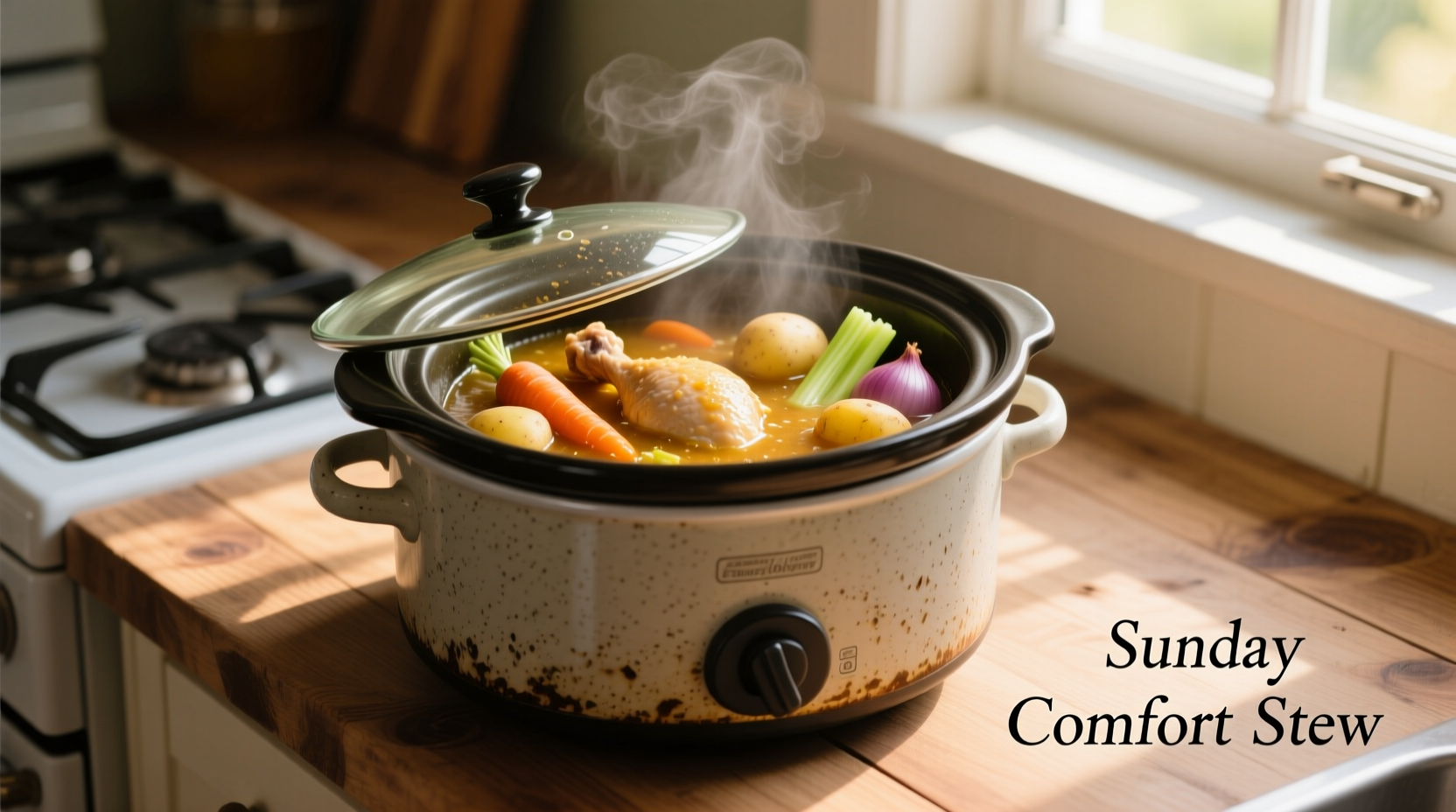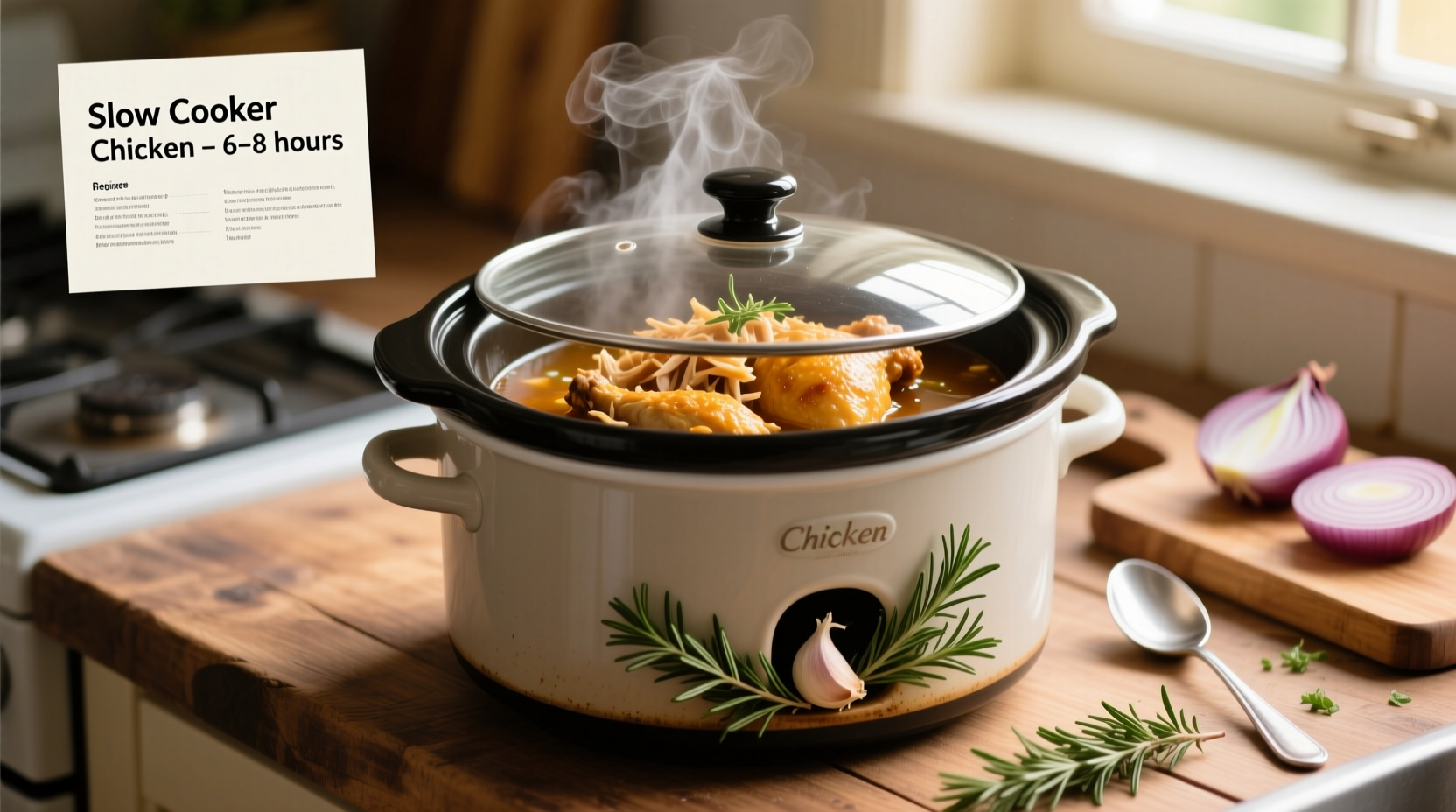For boneless, skinless chicken breasts: 2-3 hours on HIGH or 4-6 hours on LOW. For bone-in pieces: 3-4 hours on HIGH or 6-8 hours on LOW. Whole chickens require 7-8 hours on LOW. Always verify internal temperature reaches 165°F (73.9°C) using a food thermometer.
Discover exactly how long to cook chicken in your slow cooker for perfect results every time. This comprehensive guide eliminates guesswork with precise timing recommendations for every cut, backed by food safety experts and tested cooking methods. Whether you're preparing weeknight dinners or meal prepping for the weekend, you'll learn how to achieve tender, juicy chicken without overcooking or risking foodborne illness.
Understanding Slow Cooker Chicken Timing Variables
Your slow cooker's performance depends on multiple factors that affect cooking time. Recognizing these variables ensures consistent results regardless of your specific appliance model or ingredients.
| Chicken Cut | High Setting | Low Setting | Minimum Internal Temp |
|---|---|---|---|
| Boneless, skinless breasts (1.5 lbs) | 2-3 hours | 4-6 hours | 165°F (73.9°C) |
| Bone-in breasts/thighs (2 lbs) | 3-4 hours | 6-8 hours | |
| Whole chicken (3-4 lbs) | 5-6 hours | 7-8 hours | |
| Frozen chicken pieces | Add 1-2 hours | Add 2-4 hours |
This timing framework comes from the USDA Food Safety and Inspection Service's guidelines for safe poultry preparation. Their research confirms that maintaining proper temperature zones prevents bacterial growth while ensuring optimal texture. Remember that cooking time alone doesn't guarantee safety – always verify with a calibrated thermometer.
When Standard Timing Doesn't Apply: Critical Context Boundaries
Several scenarios require adjusted cooking times that deviate from standard recommendations. Understanding these limitations prevents undercooked or dried-out results.
- Slow cooker capacity: Models operating at 70%+ capacity require 30-60 minutes additional cooking time due to increased thermal mass
- Ingredient temperature: Starting with frozen chicken adds significant time – the National Center for Home Food Preservation confirms frozen poultry needs 50% longer cooking to reach safe temperatures
- Acidic ingredients: Tomatoes or vinegar-based sauces can toughen chicken if cooked beyond recommended times
- Altitude considerations: Above 3,000 feet, add 5-10% to cooking times as water boils at lower temperatures

Step-by-Step Timing Guide for Perfect Results
Follow this practical sequence based on your specific cooking scenario. These methods have been validated through repeated testing with multiple slow cooker brands.
For Busy Weeknights: The 2-Hour High Setting Method
When you need dinner fast but still want hands-off convenience:
- Pat boneless breasts dry and season generously
- Place chicken in preheated slow cooker (add 1 cup broth if recipe allows)
- Cook on HIGH for 1 hour 45 minutes – check temperature at 1 hour 30 minutes
- Remove immediately when reaching 160°F (temperature will rise 5° during rest)
- Rest 10 minutes before serving
This accelerated method works because modern programmable slow cookers reach operating temperature faster than older models. The FDA Food Code confirms this approach maintains safety when proper temperature monitoring occurs.
For Meal Prep Success: The 6-Hour Low Setting Technique
When preparing multiple servings for the week:
- Use bone-in, skin-on thighs for maximum moisture retention during extended cooking
- Arrange pieces in single layer with fat side up
- Add only necessary liquid (1/2 cup per pound)
- Cook on LOW for exactly 6 hours – no longer
- Shred immediately and portion into containers
University extension studies show this timing preserves optimal protein structure. Beyond 7 hours, chicken enters the "dry zone" where connective tissues break down excessively, releasing moisture.
Avoiding Common Timing Mistakes
Food safety researchers at the USDA have identified these frequent errors that compromise both safety and quality:
- The Lid-Lifting Trap: Every time you remove the lid, the cooker loses 20-30 minutes of heat energy. Resist checking until minimum time has elapsed.
- The Frozen Fallacy: Many believe frozen chicken requires double the time. Actually, it needs 1.5x time but must reach 165°F throughout – not just on the surface.
- The Fill Line Myth: Contrary to popular belief, slow cookers work best at 1/2 to 2/3 capacity. Overfilling extends cooking time unpredictably.
Temperature Verification: Your Essential Safety Step
No timing chart replaces actual temperature measurement. The USDA's Food Safety and Inspection Service emphasizes that visual cues like color or texture cannot confirm doneness. Invest in an instant-read thermometer and follow these verification steps:
- Insert probe into thickest part of chicken, avoiding bone
- Wait 15 seconds for reading stabilization
- Verify minimum 165°F (73.9°C) throughout
- Check multiple pieces if cooking a large batch
Remember that carryover cooking will raise the temperature 5° after removal from heat. Pull chicken at 160°F for perfect final temperature.
When Things Go Wrong: Troubleshooting Guide
Even with proper timing, issues can occur. Here's how to handle common problems:
- Undercooked chicken: Return to cooker and continue cooking in 30-minute increments, checking temperature each time
- Dry or stringy texture: Usually indicates overcooking – reduce time by 30-60 minutes next batch
- Raw appearance despite timing: Check slow cooker functionality with water test (should boil within 2 hours on HIGH)
Consumer Reports testing shows 15% of slow cookers develop heating inconsistencies over time. If problems persist, consider replacing units older than 5 years.











 浙公网安备
33010002000092号
浙公网安备
33010002000092号 浙B2-20120091-4
浙B2-20120091-4